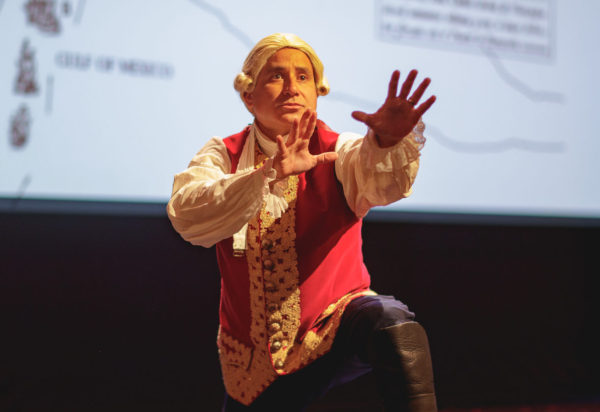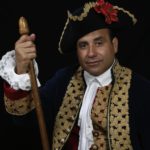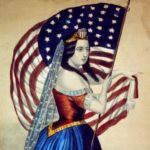
“Papi, am I a princess?”
“Yes, Anabella, you are. But we all are. In our country every one of us is a king or a princess,” I said, echoing the words of young Mr. Jefferson as played by Kurt Smith.
She was right to ask: my family was feted like never before during my recent stay as the second Revolutionary in Residence, testimony to Colonial Williamsburg’s generous spirit.
My daughter’s awe was inspired by a carriage ride to the Governor’s Palace for the Spring Garden Party. It was a fantasy come true for her (and for my wife and I) as we enjoyed an evening of live music, dancing, and fireworks!
This came near the end of my nearly month-long visit. When I arrived, I was escorted to my temporary home for the duration of my residency, the Bracken House. Rev. Bracken built the house in the 1750s. The interior features straight, Georgian lines and spacious rooms. Utility and elegance through and through, showcasing early American values.
The house’s adjoining yards have fruit trees planted with manicured hedges rising to topiary figures, but this was just the beginning!
As beautiful a place as Colonial Williamsburg was proving itself up to be, well, that’s only skin deep. By far, its true beauty lies in its ideas, its mission: “To feed the human spirit by sharing America’s enduring story.” A tall order, but one which fed me every day that I was working within its environs.
You might say my journey to Williamsburg began four years ago, when I was appointed John C. Pace Eminent Scholar from University of West Florida in order to fashion a one-man-play about the siege of Pensacola from the perspective of Bernardo de Gálvez, the governor of (then-Spanish) Louisiana, who led the 1781 assault on British defenses in Florida.
After performing “Yo Solo, Bernardo de Gálvez on the Stage of the American Revolution” for the city, money was raised to tape a live performance. To date, it has been aired in over 25 states on PBS affiliates. Teachers use it as a tool in their lesson plans to discuss the vital Hispanic role during our War of Independence.
Asked to perform the piece in Williamsburg during my residency, I refashioned it for my Virginia audience. There were two Virginia figures that worked with Gálvez to supply George Rogers Clark’s (himself a Virginian) Western Army. It seemed to be well-received; it’s a good sign when the Q&A session is longer than the scripted portion.
The audience proved their Revolutionary War mettle with profound questions. “What role did Spanish slaves play in the Gálvez’s army?” “How much aid given and what routes did the Spanish use to supply the American effort?” “Were Spanish officers trained under the French military academies or did they have their own?” “How difficult was it to use all the branches of different nations to come to bear on Pensacola?” I’ve never been asked such insightful questions, rippling with intellectual and emotional interest. It was a pleasure to perform that night.
I shouldn’t have been so surprised. While I was rewriting and rehearsing Yo Solo, I saw much of Colonial Williamsburg’s programming. Never performed in black and white, always in gray, the themes in these wonderfully rendered pieces feed the human soul indeed!
I listened to an enslaved man work out his intricate allegiance of spying for the American cause—one which all but guaranteed his bondage if successful. I witnessed two women who yearned to be friends but were separated by the accident of skin color. I saw a young indigent prince, educated at William & Mary, having to decide which side his people should cast their lot with. I saw the adage played out “that a difference of opinion is not one of principle,” in a flawlessly executed debate between Patrick Henry (Richard Schuman) and George Wythe (Chris Hull).
I watched the very incarnation of a young James Madison (Bryan Austin), embarking upon his star-studded career in American politics: the indispensable man who would all but author our Bill of Rights. I witnessed an electrifying encounter between an elder Thomas Jefferson (master interpreter Bill Barker), the bodily culmination of the Enlightenment, and his younger self (Kurt Smith). These two gentlemen brought me to tears. The audience was spellbound at the moment when both men recognize themselves as the same person! (Prompting everyone watching to ask: “What would I say to my older/younger self?)
And much more.
I don’t know anywhere else in the country where, with a single entrance fee, such quality programming can be experienced. I had the honor of leading a workshop with these terrific artists, to whose luster I had little to add, except, perhaps, for a few exercises and considerations to make them shine ever brighter.
When my family joined me on the last few days of my residency, I took in a Punch and Judy show with my four-year old daughter. She delighted in the hijinks of a commedia dell’arte performance by the Chowning Family Players at the Playbooth Theatre.
I fear my daughter may have picked up the “theater bug” there.
She and my wife, Ileana Musa Mena, were later fitted with a dress at the Mary Dickinson Shop.
I’m grateful for the expert help given me by Carl Childs, Juleigh Clark, and Inge Flester at the John D. Rockefeller, Jr. Library, where I had a spacious office and 24/7 access. Allowing me to come in after (or before) hours made all the difference.
I am well on my way with my research subject, Juan de Miralles, America’s first de facto Spanish Ambassador and fast friend of the Washingtons. I have corroborated his month-long stay in Colonial Williamsburg during May 1778, while traveling by land, north to Philadelphia and the Continental Congress.
My whole family reveled in the scrumptious menus and the music in the historic taverns. During gambols at Chownings, my young daughter sang with me and I danced the flamenco (to a standing ovation) with my wife. Where else can this happen?
So yes Virginia, there is a Santa Claus; and yes, Anabella, you are a princess. We live in a country where human life is valued, in theory, as if each and every one of us were royalty. Or more specifically: where royalty was diminished from reality to a metaphor by our republic’s ideals, only the People being sovereign. This is closer to reality itself and the reason why our enduring story continues to feed the human spirit.
GUEST BLOGGER: CHAZ MENA
Actor and scholar is Colonial Williamsburg’s second Revolutionary in Residence. He has an MFA from Carnegie-Mellon University and is fluent in Spanish, French, and Russian.
Mena’s recent on-screen credits include recurring roles on the Netflix series “Bloodline,” USA Network’s “Graceland” and “Burn Notice,” the feature film “Pain & Gain” starring Mark Wahlberg, and appearances on dozens of TV series and independent films (see www.chazmena.com for more film and stage credits).
The Revolutionaries in Residence program, which hosts provocative thinkers who engage audiences with fresh perspectives that embody the spirit and relevance of the Revolutionary era, is generously sponsored by The Grainger Foundation of Lake Forest, Illinois.


William Sommers says
Mr. Mena,
I greatly enjoyed your Colonial Williamsburg articles and entries, and the online video of your one-man show on Gálvez. I am originally from Mobile and my family is from New Orleans so it was interesting to learn about the Revolutionary War campaigns in those areas. I had no idea! I have since learned that I am a descendent of Nicholás Forstall who I suspect served in the militia under Gálvez in Louisiana (e.g., Fort Bute and Baton Rouge). If you have any information or references touching on Forstall from your research on Gálvez I would appreciate anything you can share. Thanks!
Wonderful! I read about Mr. Mena in the summer “Trend and Tradition” today, and what a wonderful story that was! His research sounds so exciting, especially the one-man show.
Chaz Mena says
Ms. De Ardo:
Thank you so much. Please contact me and I will keep you abreast of all developments there. To contact me use this: http://chazmena.com/contact-chaz/
Thanks so much for your kind note!
-cm
What an insightful and poignant reflection on Colonial Williamsburg! Thank you, Mr. Mena!
Chaz Mena says
Oh, dear friend, thank you for saying that!